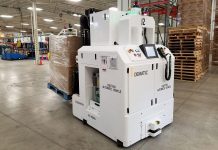Consumers’ growing interest in sustainability when making purchasing decisions, and their willingness to pay extra for eco-friendly options, is a well-documented trend. Studies indicate that a minimum of 65% of global consumers prefer sustainable products and services, and a significant majority are open to paying a premium for environmentally conscious choices.
In response to this consumer demand, companies are increasingly exploring ways to cater to sustainability-minded individuals. A recent development in this pursuit involves companies extending their focus beyond the final products and delving into more sustainable practices throughout their supply chains. This approach can significantly reduce the overall environmental impact of their offerings, primarily by cutting down on shipping and transportation requirements and the associated emissions, particularly from long-distance sources. Not only does this benefit the environment, but it also aligns companies with prevailing trends, industry standards, and regulations, appealing to eco-conscious consumers.
In fact, a growing number of major corporations have committed to enhancing the sustainability and transparency of their supply chains, including packaging components. These commitments underscore the growing importance of supply chain sustainability. Enhancing supply chains plays a pivotal role in advancing overall sustainability and combating climate change because Scope 3 emissions, which encompass packaging, transportation, product disposal, and other supply chain aspects, account for 90% of the greenhouse gas emissions produced by large companies.
One of the most effective ways for companies to bolster the sustainability of their supply chains is not only to embrace more environmentally friendly packaging, including compostable alternatives but also to ensure that this packaging is manufactured in close proximity to where it will be used. Locally sourced sustainable packaging offers a dual benefit for businesses and the environment.
Apart from the environmental advantages, local production of packaging leads to cost savings on transportation. Furthermore, it supports local employment opportunities and contributes to the local economy, values that an increasing number of consumers prioritize and are willing to pay a premium for. Over 70% of Americans express a preference for shopping locally to support their communities.
Compostable packaging is emerging as a viable alternative to conventional plastics and is increasingly available from local sources. Compostable packaging suits products of various sizes and types, ranging from clothing to food and fresh produce. Its popularity is on the rise, with experts estimating that the global market for compostable food service packaging currently stands at approximately $20 billion and is projected to reach $30 billion in the next decade. A similar growth trajectory is anticipated for compostable packaging in other industries.
Compostable options are particularly attractive for businesses aiming to align with sustainable practices. While recyclable materials have long been favored, the unfortunate reality is that a significant portion of globally produced plastic intended for recycling ends up in landfills. Only 9% of global plastic production is successfully recycled, with much of the plastic labeled as “recyclable” eventually becoming microplastics, a problem considered even more significant than full-sized plastics. To truly fulfill sustainability claims, companies should turn to compostables, which break down into agricultural compost, enhancing crop yields and capturing atmospheric carbon.
Bringing together these two concepts – producing sustainable, ideally compostable, packaging locally – can position companies favorably in the eyes of consumers who prioritize healthier and environmentally friendly choices. With locally sourced compostable packaging, companies not only enhance their sustainability but also meet the demands of their eco-conscious customers.
This initiates a virtuous cycle: the production and sale of sustainable products in sustainable packaging lead to reduced pollution and packaging waste, job creation in the community, increased sales for local companies, and rising demand, resulting in more production of sustainable products, and the cycle repeats.
Given the escalating waste issue, kickstarting this virtuous cycle is now more crucial than ever. The technology, demand, and market are all in place, making it a profitable move for companies and a positive impact on the world.























